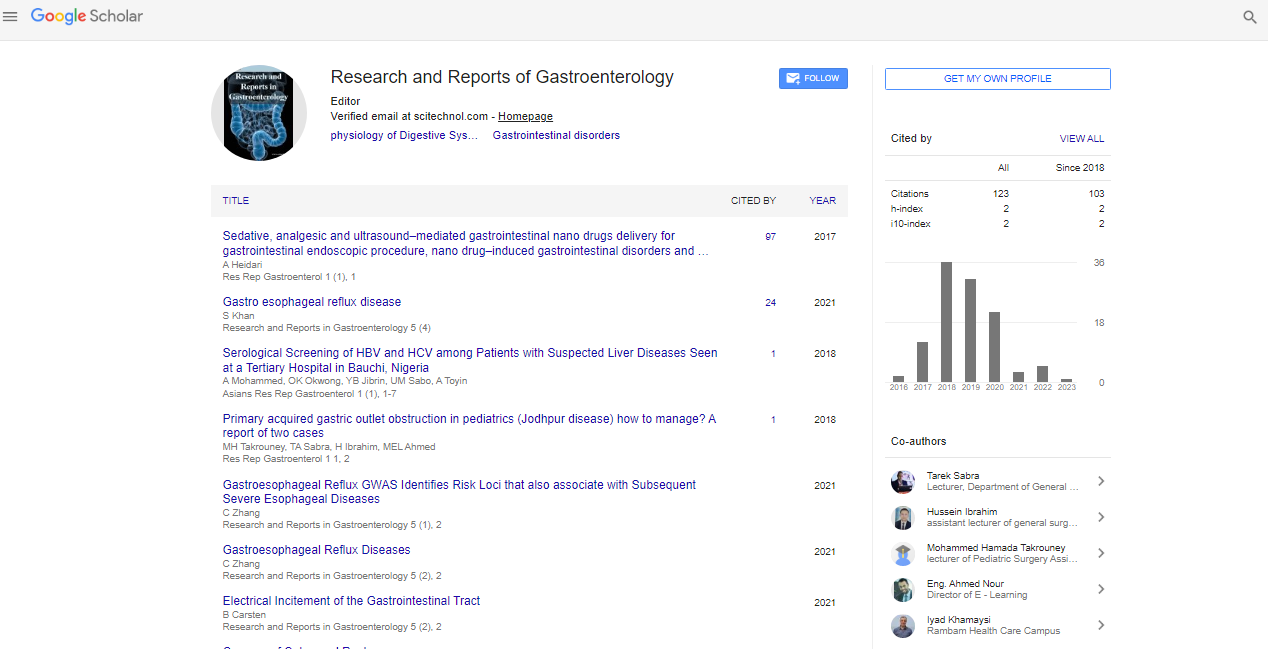Perspective, Res Rep Gastroenterol Vol: 7 Issue: 2
Long-Term Outcomes of Bariatric Surgery in the Management of Obesity-Related Gastrointestinal Disorders
Amy Heather*
1Division of Gastroenterology, University of Pennsylvania, Philadelphia, USA
*Corresponding Author: Amy Heather,
Division of Gastroenterology, University of
Pennsylvania, Philadelphia, USA
E-mail: heatheramy@gmail.com
Received date: 15 May, 2023, Manuscript No RRG-23-106617;
Editor assigned date: 17 May, 2023, PreQC No RRG-23-106617(PQ);
Reviewed date: 01 June, 2023, QC No RRG-23-106617;
Revised date: 08 June, 2023, Manuscript No RRG-23-106617 (R);
Published date: 16 June, 2023, DOI: 10.4172/Rrg.1000142
Citation: Heather A (2023) Long-Term Outcomes of Bariatric Surgery in the Management of Obesity-Related Gastrointestinal Disorders. Res Rep Gastroenterol 2023, 7:2.
Abstract
Description
Obesity is a global health concern that is associated with numerous Gastrointestinal (GI) disorders, including Gastroesophageal Reflux Disease (GERD), Non-Alcoholic Fatty Liver Disease (NAFLD), and Inflammatory Bowel Disease (IBD). Bariatric surgery has emerged as an effective intervention for weight loss and the management of obesity-related conditions.
Gastroesophageal reflux disease
GERD is a common GI disorder characterized by chronic acid reflux. Obesity is a major risk factor for GERD due to increased intraabdominal pressure and reduced lower esophageal sphincter tone. Bariatric surgery, particularly Roux-en-Y Gastric Bypass (RYGB) and Sleeve Gastrostomy (SG), has been shown to provide significant improvements in GERD symptoms and disease severity. Long-term studies have reported sustained resolution or improvement of GERD symptoms in a majority of patients following bariatric surgery. Reductions in acid reflux, esophageal inflammation, and the need for medication have also been observed.
Non-alcoholic fatty liver disease
NAFLD is characterized by excessive fat accumulation in the liver and is strongly associated with obesity. Bariatric surgery has demonstrated substantial benefits in the management of NAFLD. Long-term studies have shown that bariatric surgery leads to significant reductions in liver fat content, improvements in liver enzymes, and histological improvements in liver tissue. Resolution or improvement of NAFLD has been reported in a significant proportion of patients following bariatric surgery. These improvements in liver health are associated with a decreased risk of progression to more severe liver diseases, such as non-alcoholic steatohepatitis and cirrhosis.
Inflammatory bowel disease
Obesity is known to influence the course and outcomes of IBD, including Crohn's Disease (CD) and Ulcerative Colitis (UC). Bariatric surgery has been studied as a potential intervention for weight loss and disease management in obese patients with IBD. While the evidence is limited, some studies suggest that bariatric surgery may lead to improvements in disease activity and medication use in obese patients with CD or UC. However, further research is needed to better understand the long-term effects of bariatric surgery on IBD outcomes.
Other Gastrointestinal disorders
Bariatric surgery has also shown positive effects on other obesityrelated GI disorders. Improvement in symptoms and disease severity has been observed in conditions such as gallstone disease, Irritable Bowel Syndrome (IBS), and fecal incontinence following bariatric surgery. Weight loss and metabolic improvements associated with bariatric surgery contribute to these positive outcomes.
Mechanisms and considerations
The mechanisms underlying the beneficial effects of bariatric surgery on obesity-related GI disorders are multifactorial. Weight loss achieved through bariatric surgery leads to reductions in intraabdominal pressure, improved gut hormone regulation, and favorable changes in gut microbiota composition. These factors collectively contribute to symptom resolution, disease improvement, and metabolic benefits.
It is important to note that bariatric surgery is not without risks, and careful patient selection and long-term follow-up. Nutritional deficiencies, gastrointestinal complications, and the need for lifestyle modifications should be considered and addressed to ensure optimal outcomes.
Conclusion
Bariatric surgery has emerged as a valuable intervention for weight loss and the management of obesity-related GI disorders. Long-term studies demonstrate sustained improvements in GERD symptoms, resolution or improvement of NAFLD, and potential benefits in the management of IBD and other GI conditions. Bariatric surgery provides a comprehensive approach to address the multifaceted impact of obesity on the GI system. While further research is needed to better understand the long-term effects and patient selection criteria, bariatric surgery offers a promising strategy for improving the long-term outcomes and overall well-being of patients with obesity-related GI disorders.
 Spanish
Spanish  Chinese
Chinese  Russian
Russian  German
German  French
French  Japanese
Japanese  Portuguese
Portuguese  Hindi
Hindi 